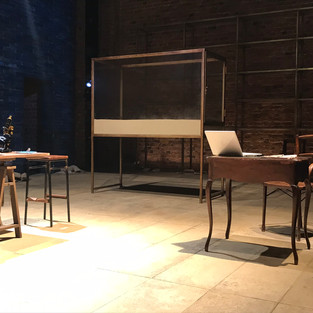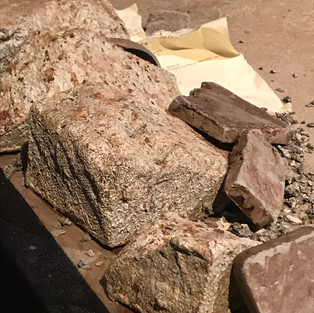A Museum in Baghdad at the Swan Theatre, RSC - 11th January 2020.
- Steven Humphries

- Jan 22, 2020
- 3 min read
This was my third visit to see the play and I was happy to see the full cast all at work. My frst visit back in November was to see the understudy rehearsal and with multiple parts played by the same actors I admit I may have missed a couple of the nuances, although I will say the understudy cast were all excellent and could have easily been the main cast if you didn't know. On my second visit, to see the main cast performance Debbie Korley was ill and her part of the American soldier was played by Sarah Agha, who I'll admit was excellent. So this was my first performance with everyone in place.

Something a little different here for the RSC, a modern play. Written by Hannah Khalil and directed by Erica Whyman and starring Emma Fielding as Gertrude Bell, this unique and thought provoking play tells two parallel stories of two women. The first is the famous Gertrude Bell working on setting up the first Museum in Baghdad back in 1926. The second is Ghalia Hussein working on re-opening the Museum after riots and thefts after Saddam in 2006. The two stories run parallel and we have beautiful crossover scenes where we realise that despite being 80 years apart the two women essentially still face the same problems. We also have the character of Abu Zaman who appears across both time periods to reinforce this and keep everything moving along.

Actors? Can't fault any of them. Emma Fielding and David Birrell have real chemistry together and are both outstanding actors. Houda Echouafni and Riad Richie both have lovely scenes together, and Debbie Korley adds some humour to the play. Rasoul Saghir holds the play together as Abu Zaman and Ali Gadema is great as the kidnapper and Prime Minister. Just a note here that Ali was fantastic when I saw him at the understudy performance as Abu Zaman. Shame he didn't get to perform this on one of the main nights. Zed Josef plays Salim, Gertrude's assistant, which he does with great emotion to a very high standard. Rendah Heywood is also excellent as the modern museum director Ghalia. Finally the cast is completed by my favourite, Nadi Kemp-Sayfi, who plays Nasiya. I just love how she moves around the stage and the sad look she possesses. I don't know if she can already speak Arabic or if she had to just learn the Arabic lines just for the play, but I could listen to her all night.
The set is sparse comprising of just a trestle table, smaller table, rocks and a glass cabinet. There is also a shelving unit at the back which gets filled up with artefacts as the play progresses, but using lightning and projections. The music is also very good and I find it a shame they didn't issue a CD to go along with the production. The costumes are also good and help us differentiate between the two time periods.
There is one thing I keep changing my mind about. The goddess statue. The beauty of the goddess statue is referred to throughout the play and is one of the key parts of the story, but we never actually see it. All we see is the empty glass case. Now there are multiple reasons Hannah wants to it be empty which I won't give away here, however part of me still wants to see it. Even though I know the play needs it to be empty, and I'm sure it couldn't be as good as anything the audience is thinking of.
In conclusion, this is a very moving play. Well worth seeing at least once, but I did find I got so much more from it the second and third times. I also like how the cast have been so proud of it, and hopefully it will do well when it goes to the Kiln Theatre in London in April.
To look at some lovely production photos and to book tickets go to :











Comments